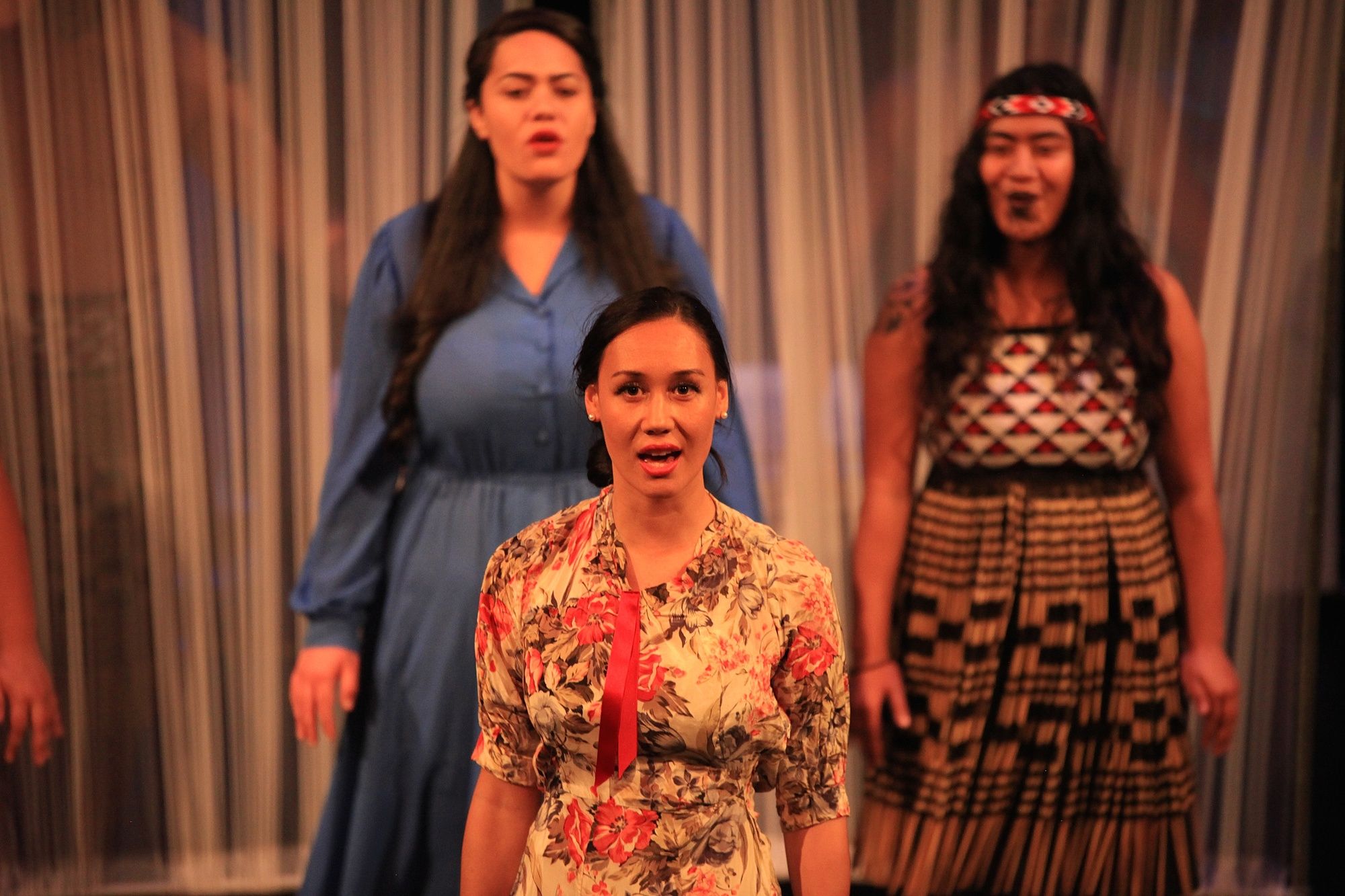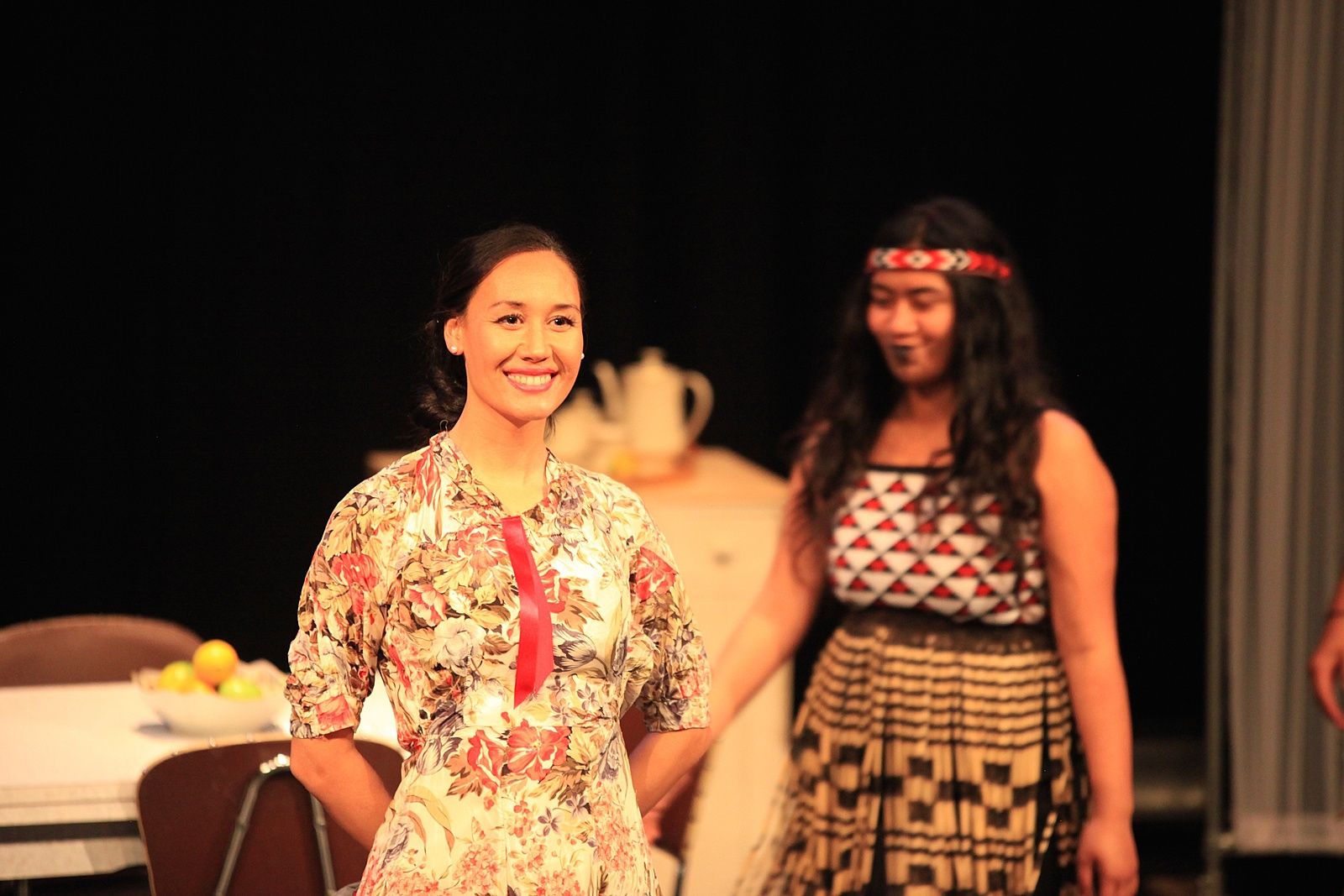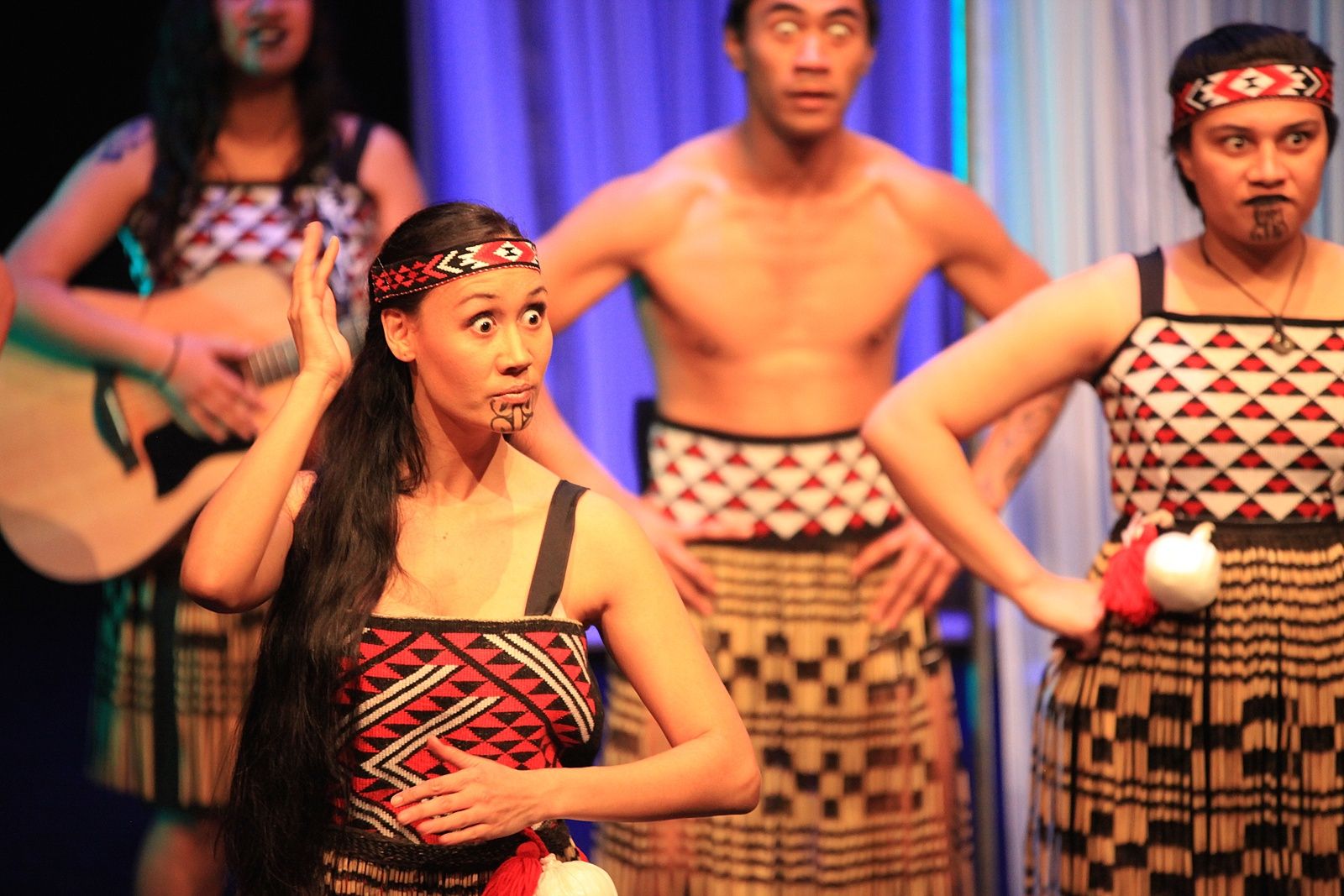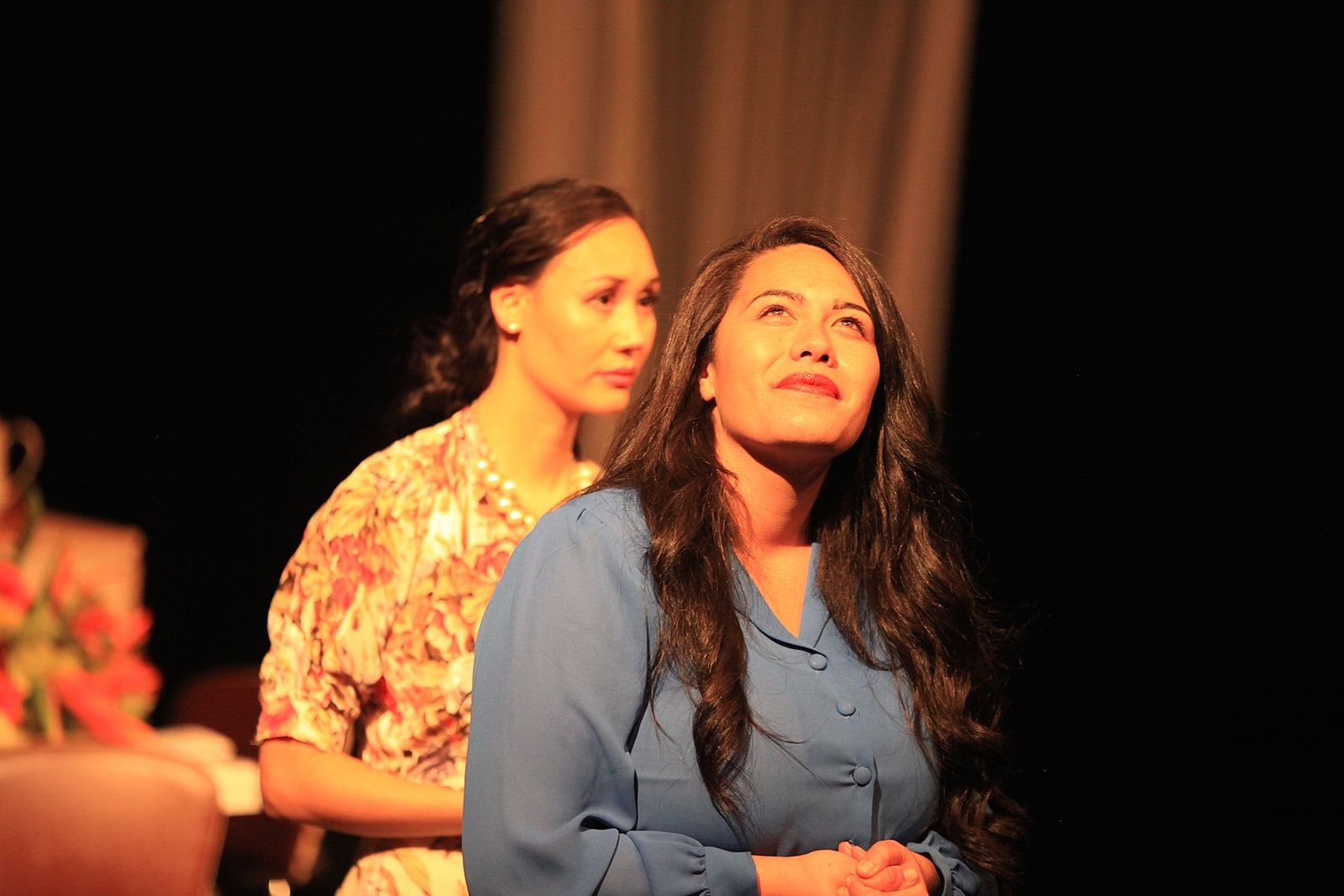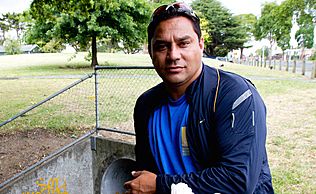He Whānau, He Ūkaipo: A Review of Te Puhi
Cian Elyse Waitī's play is set in the world of 1950s beauty pageants and as Tāmati Patuwai discovers, it's an assured playwrighting debut
Cian Elyse Waitī's play is set in the world of 1950s Miss New Zealand pageants and as Tāmati Patuwai discovers, it's an assured playwrighting debut from the Te Arawa performer and director.
The Māori term “Puhi” is commonly interpreted as the vestal virgin and is a strong expression of the sacredness of womanhood. Puhi can also mean ‘nobility’, and ‘one who is highly esteemed’. By way of custom and belief, the Puhi is sanctified and set apart and must always be honoured and protected.
Cian Elyse-Waitī has aptly named her debut play Te Puhi and it’s a superb theatrical gem that celebrates Māori and New Zealand culture.
Te Puhi is based on the lives and experiences of Moana Manly and Mereana Waaka, who both hail from Rotorua and who both, at different times, won the Miss New Zealand beauty queen title. Set in the burgeoning tourist mecca and Te Arawa epicentre of Rotorua in the 1950s, the play tells the story of Te Puhi Johnson, a young Māori cultural entertainer who, under her eldest sister’s harsh tutelage goes on to win the Miss New Zealand pageant. What follows is a wholehearted and intricate story of cultural pride and heartbreak.
Cian Elyse Waitī also hails from Rotorua, and her writing charms the audience with kapa haka, tongue-in-cheek humour and sensuality. However Waitī steers well clear of any cultural platitudes, threading in wide-ranging and complex cultural issues that are as relevant today as they were in the 1950s.
Waitī is well-known as a stage and screen performer, and through this poetic tapestry, Te Puhi firmly situates Waitī as a playwright of great ability. Her attention to structural detail is quite remarkable for a new writer; expositions and plot layers are carefully posited, and the audience is led through well-formed themes and sound character developments. Such care with the quality of these elements is reminiscent of playwrights such as Briar Grace-Smith and Hone Kouka to name a few.
The clearly well-constructed text has offered director Te Kohe Tūhaka a complex palate from which to draw from, and together Waitī and Tūhaka have found a creative harmony and assembled a slick performance and technical crew.
The Herald is a dynamic space with some notable limitations, including a modest performance area and a steep seating rake which offers noticeable challenges to stage choreography and performance. However, Tūhaka and designer Jane Hakaraia have navigated the space masterfully with the use of gauze-shaped panels. These provide structural design motifs that rearrange the space effectively. The 1950s dresses and high-waisted trousers conjure a wonderful air of style and grace. With such attention to detail in the costuming, the “maro” or Māori apron is slightly jarring as it's clearly a contemporary material and costuming treatment.
Taupunakohe Tocker plays the central character Te Puhi. With many years of experience as an actor and performer, Tocker carries the audience through the story with an understated charisma. She has some delightful comedic moments, and there are many opportunities for her to capture our hearts with her beautiful singing.
Roimata Fox’s performance as Hineruhi is arresting and equally as charming, providing a sturdy balance to Te Puhi’s naiveté. Hineruhi is vigilant in her direction and protection of her young sibling. So much so that Te Puhi is often smothered. However Fox never suffocates the space and is consistently bound to the truthfulness and reality of the characters world. Her finely-tuned, old-school Māori ways, with insistence on etiquette and chivalry, have the audience riveted.
Sophie Lindsay is Judith, who becomes Te Puhi’s talent agent. The role carries much of the adverse cultural weight of the play, as Judith seeks to mine the small Māori world of its most prized jewels; namely its beautiful young women. Lindsay brings a sincerity to the character which deflects the 'easy to blame' stigma that comes with obviously antagonising forces.
Eds Eramiha plays Rākei, who is Te Puhi’s childhood sweetheart. The role itself coupled with Eramiha’s gracious presence are positioned as thematic supports to the main character and storyline. Triple threat is not enough to describe the likes of Eramiha’s manifold talents. This young man embodies the range and potency of the upcoming generation of Māori performer. Tīhei Mauri Meke!!
Throughout there's a jarring edge as the dream of life out of the village – the image of Pākehā trappings and culture – slowly but surely dislocate the sanctity of the whānau and home.
Antonio Te Maioha plays Te Puhi’s uncle Tūhawaiki. Tūhawaiki is the master of ceremony for the Māori performing team. Reminiscent of a young, swooning Howard Morrison, Maioha’s Tūhawaiki spins and slips round the stage, dressing and undressing, enticing the audience to celebrate all that the night has to offer ("wink wink"). He is the quintessential Te Arawa show man.
And last, but certainly far from the least, Te Marama Concert group. The kapa haka roopu, led by Wiremu Mako give relish to the cultural and emotive qualities of the play. There is a certain innocence in the traditional ‘haka’ performance that highlights Te Puhi’s delicate journey.
And what a journey it is. This heart-wrenching story offers some of the dreamiest and tender allusions to a wonderful Māori way of life. The music, the outfits, the cooking and the reveries of life abroad, all speak to a distinctive bygone era. Yet throughout the insightful material there's a jarring edge as the dream of life out of the village – the image of Pākehā trappings and culture – slowly but surely dislocates the sanctity of the whānau and home. A core saying that the characters repeat is “He whānau, he ūkaipo”. It's an expression of unity in family and that the deepest sense of wellbeing is sought from the homeland of one’s ancestry. Herein lies the utopian Māori experience. However, Te Puhi is consistently urged to pursue the Pākeha way of life. This manifests in the way she speaks, even to the point of bending her native tongue to suit the ‘ears’ of the Pākehā, and curtseying apologetically when seeking correction. This display cuts to the core of the disestablishment of Te Ao Māori me ōna Tikanga. It's all too familiar, and this play does a great job of representing the experience.
With much admiration for a wonderful cast and crew, much of the success of this production revolves around a well-rounded, finely crafted script. The character journey, twists, and performance styles are clearly sown into the pages of this piece. The plot and character developments are placed very logically. In doing so, the writer facilitates a vital affinity, sinking the play's ideas deep into the hearts of the audience. Nō reira, ē Puhi, tēnā koe mō tēnei tākoha.
There's so much to celebrate with the advancement of Māori theatre and Te Puhi is a significant contribution to this movement. Commendations to Waitī Productions and the Kapa of Te Puhi.
Heoi, e rere ana ngā whakamihi ki te waka o Te Arawa. He rahi ngā hua papai me te wai reka i puta mai i te whakaari nei. E kiia nei te kōrero, “e kore e taka te parapara a ōna tīpuna, tukua iho ki a ia” Ko Te Arawa tēra e whakapaoho tonu ana i te ataahua o te ao Māori me kii. Nō reira, e kore mutu nga mihi ki o koutou rawa me o koutou pūkenga motuhake.
Tēna koutou katoa.
Te Puhi runs from June 13-17 at the Herald Theatre. Tickets available here.
